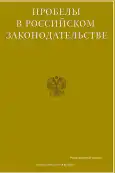Activities of the Russian Federation to Counter Extremism and Terrorism in the Eurasian Space at the Present Stage
- Authors: Misrokov T.Z.1
-
Affiliations:
- Krasnodar University of the Ministry of Internal Affairs of Russia
- Issue: Vol 16, No 5 (2023)
- Pages: 111-118
- Section: General theoretical, criminal-legal and other problems of Countering extremism and terrorism. Problems of preventing extremism and terrorism
- URL: https://journal-vniispk.ru/2072-3164/article/view/250136
- EDN: https://elibrary.ru/IHMRXQ
- ID: 250136
Cite item
Abstract
The article analyzes the activities carried out by the Russian Federation to combat the threats of extremism and terrorism in the Eurasian space in the current conditions of global economic, political and other changes. The author examines the legal, political, socio-economic and other measures taken by the Russian Federation in matters of ensuring stability and security on the territory of the Eurasian continent.
The purpose of the work is to identify and critically comprehend the gaps and problems that have developed in the expanses of Eurasia in countering threats of an extremist and terrorist nature, as well as to formulate proposals for improving approaches to the formation of a unified Eurasian system of international security capable of promptly responding to emerging challenges and crisis phenomena. caused by the activities of terrorist and extremist organizations.
The author comes to several conclusions. Firstly, the activities of the Russian Federation to counter extremism and terrorism in the Eurasian space should be of a preventive nature, based on a systematic analysis of ongoing processes, forecasting threats based on the generalization of the data obtained. Such analytical activity is possible only with the formation of a system for the exchange of information, the consolidation of the collected data and their prompt transfer between the countries of the Eurasian region of our planet.
Secondly, successful counteraction to extremism and terrorism is possible only if these threats are adequately perceived by the states participating in international efforts to ensure peace and security. It is impossible to ensure domestic security and international security with an active fight against terrorism, but the absence of a full-fledged counteraction to threats of an extremist nature, which in the future will create a breeding ground for further terror.
Thirdly, successful countering extremism and terrorism goes beyond just law enforcement and military tasks. An important aspect of the fight against these threats is the elimination of the causes and conditions conducive to their spread. Such conditions include socio-economic instability, low level of education, lack of information literacy of the population, unemployment and a number of other factors, unresolved ethnic, religious, cultural and other conflicts.
Full Text
##article.viewOnOriginalSite##About the authors
Tengiz Z. Misrokov
Krasnodar University of the Ministry of Internal Affairs of Russia
Author for correspondence.
Email: misrokovs@mail.ru
SPIN-code: 4614-3180
Scopus Author ID: 890723
Cand.Sci.(Law), Senior Lecturer of the State, Civil and Law Disciplines Department, North Caucasus Institute for Advanced Studies (branch)
Russian Federation, Nalchik, KBRReferences
- Bogdanov A.V., Il’inskiy I.I., Khazov E.N. Terrorism and extremism – a threat to modern civilization // Bulletin of Academy of economic security of the Ministry of Internal Affairs of Russia. 2021. № 1. pp. 181-187.
- Wu Chi-Yuan. Interaction of the participating countries within the framework of the CSTO // Post-Soviet Studies. 2022. № 6(5). pp. 645-646.
- Wu Chi-Yuan. The problem of participation and interaction of the CIS states within the SCO // Post-Soviet Studies. 2022. № 7(5). pp. 703-710.
- Gallyamova D.A., Aminov I.R. The SCO'S role in international security // International Journal of Humanities and Natural Sciences, № 12-1(75), pp. 78-81.
- Grinko S.D. Youth extremism prevention // Civil service and personnel. 2021. № 1. pp. 133-135.
- Zakirov B.B. On the role of the Shanghai Cooperation Organization in regional and international security // International Research Journal, № 8 (122), 2022. pp. 77.
- Kozinets A. I., Dmitrieva M. O. The changing balance of power in Eurasia and prospects for Russian-Chinese cooperation // PACIFIC RIM: Economics, Politics, Law. 2022. № 3. pp. 73-88.
- Rumyantseva A.K., Rakhimov K.Kh. The SCO's role in countering terrorism in Central Asian countries // Post-Soviet Studies. 2022. № 8 (5). pp. 835-846.
- Skalepov A.N., Lagutkin N.V. Central Asia at the Crossroads of Geopolitical Strategies // Military Thought. 2022. № 2. pp. 6-20.
- Vorkunova O.A. External and internal threats to the security of the EEC countries and problems of peacebuilding // Post-Soviet Studies. 2021. № 4(8). pp. 679-694.
Supplementary files








